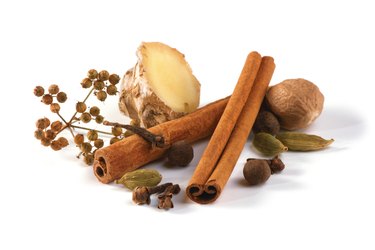
Gastritis develops when the stomach lining becomes inflamed. Doctors often prescribe antacids and histamine blockers to reduce acid production or antibiotics, if gastritis is due to an infection. Scientific research shows that ginger may be effective in killing bacteria that frequently cause gastritis. In addition, cinnamon can combat E. coli, another bacteria connected with gastrointestinal inflammation. Before attempting to treat stomach pain or gastritis with herbs, speak with a physician.
Gastritis
Video of the Day
Causes of gastritis include excess alcohol consumption; long-term ingestion of nonsteroidal anti-inflammatory drugs, NSAIDs; viruses; and digestive and autoimmune diseases. The most routine cause of gastritis is the Helicobacter pylori bacteria, also strongly associated with ulcers and gastric cancers. It is estimated that the Helicobacter pylori bacteria may infect 20 to 50 percent of Americans; but in less developed regions, the estimate climbs to 80 percent, according to the National Digestive Disease Information Clearinghouse. If you have gastritis, you may have upper abdominal pain or pressure. Many cases, though, are asymptomatic.
Video of the Day
Ginger
If tests show the presence of Helicobacter pylori bacteria, HP, in your intestinal tract, your doctor may prescribe antibiotics. In a 2005 study published in "Phytotherapy Research," researchers tested 24 botanical extracts on 15 different HP strains. Ginger was one of the three most effective extracts in eliminating HP bacteria, along with nutmeg and rosemary. Ginger, a spice derived from the root of a perennial tropical plant, is a well-known therapy for dyspepsia, nausea and motion sickness. Medical research suggests that ginger root is also effective in soothing inflamed tissue. Constituents in the root's volatile oils called gingerols appear to have anti-inflammatory properties, according to Merrily A. Kuhn, Ph.D., author of the 2008 book "Winston and Kuhn's Herbal Therapy and Supplements."
Cinnamon
Cinnamon bark has long been used as a culinary spice and medicinal remedy. Folk healers have relied on cinnamon to treat conditions such as indigestion, inflammation and arthritis. It is a carminative spice, one that relieves intestinal gas and helps digestion. Laboratory studies, according to the Memorial Sloan-Kettering Cancer Center, MSKCC, have indicated cinnamon's usefulness to reduce inflammation and kill microbes. Research also shows that the spice is effective in eliminating the E. coli bacterium, which is linked to intestinal inflammation, according to the April 2007 "Brazilian Journal of Infectious Diseases."
Cautions
If you are taking anticoagulant medications, be aware that ginger may increase their blood-thinning capability, cautions Kuhn. In addition, notes MSKCC, cinnamon contain coumarin, a blood-thinning agent and should not be taken with anticoagulants. Cinnamon also lowers blood glucose levels, which may be a concern if you have diabetes.